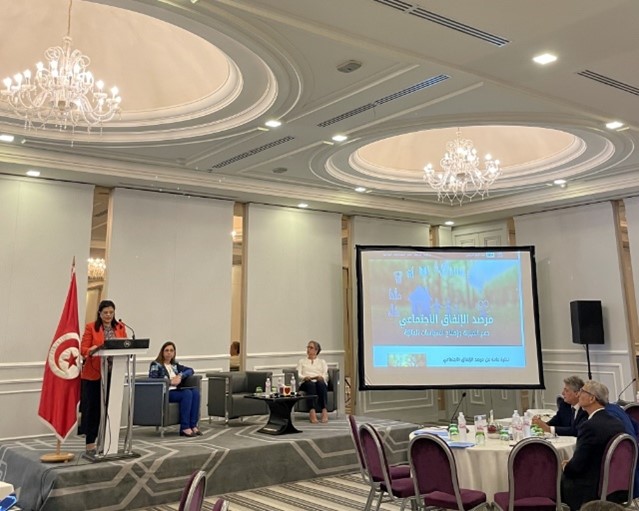Social Expenditure Monitor (SEM): An integrated framework for supporting macro-fiscal policies and the SDGs in the Arab region (ESCWA)
 Public social expenditures are critical means for implementing the 2030 Agenda on sustainable development. They are essential investments in human capital, drivers of productivity and correctors of inequity. This project focused on the development and implementation of the Social Expenditure Monitor (SEM) tool to provide comprehensive mapping of public social expenditure to inform budgeting and social policy reforms. The SEM tool helps policymakers to improve efficiency and effectiveness of social expenditure and supports policy reforms toward optimizing the relationship between social expenditure, social development priorities and macro-fiscal sustainability. The tool was successfully launched in the target countries, Jordan and Tunisia, and targeted capacity-building and training workshops equipped stakeholders with technical skills in monitoring, analysis and informed budgeting using the SEM tool. The SEM tool was also expanded to include social expenditure data and analysis for seven additional member States. Officials were trained to use the SEM tools for policy analysis and to update information through an automation procedure which ensures sustainability of the SEM. At the regional level, the project has led to wider partnership with the IMF on advanced measurement of social expenditures and to its endorsement through the production of a joint paper between ESCWA and IMF. In addition, a collaboration with UNDP and UNICEF led to the production of a regional SEM Report in the Arab Region, the first of its kind, launched in a regional workshop with participation of member States (representatives from finance, social affairs and planning ministries) that discussed the policy recommendations of the report. With interest from four other member states in the SEM, ESCWA engaged with the national authorities for country specific technical assistance.
Public social expenditures are critical means for implementing the 2030 Agenda on sustainable development. They are essential investments in human capital, drivers of productivity and correctors of inequity. This project focused on the development and implementation of the Social Expenditure Monitor (SEM) tool to provide comprehensive mapping of public social expenditure to inform budgeting and social policy reforms. The SEM tool helps policymakers to improve efficiency and effectiveness of social expenditure and supports policy reforms toward optimizing the relationship between social expenditure, social development priorities and macro-fiscal sustainability. The tool was successfully launched in the target countries, Jordan and Tunisia, and targeted capacity-building and training workshops equipped stakeholders with technical skills in monitoring, analysis and informed budgeting using the SEM tool. The SEM tool was also expanded to include social expenditure data and analysis for seven additional member States. Officials were trained to use the SEM tools for policy analysis and to update information through an automation procedure which ensures sustainability of the SEM. At the regional level, the project has led to wider partnership with the IMF on advanced measurement of social expenditures and to its endorsement through the production of a joint paper between ESCWA and IMF. In addition, a collaboration with UNDP and UNICEF led to the production of a regional SEM Report in the Arab Region, the first of its kind, launched in a regional workshop with participation of member States (representatives from finance, social affairs and planning ministries) that discussed the policy recommendations of the report. With interest from four other member states in the SEM, ESCWA engaged with the national authorities for country specific technical assistance.
The project also developed a user-friendly online portal for the SEM and a framework linking the SEM to the SDGs with gap analysis and mapping budgeting to social policies and programs for each participating project country. Additionally, an economic modelling and simulation tool was developed for each project country, to analyze allocative efficiency, growth and baseline and alternative macro-fiscal scenarios considering rising social expenditure needs for achieving the SDGs. Finally, the project facilitated the production of statistical guidelines (Manual) on coherent data reporting of social expenditures
The activities undertaken by the project have made significant contributions to the SDGs and the principle of "leaving no one behind". The SEM framework maps public services and their beneficiaries and is aligned with several targets under a number of SDGs, fueling progress on education, health, housing and community amenities, social protection, environment, poverty and inequality. The tool also supports SDG 17, as effectiveness of social expenditure is positively associated with tax revenue performance and fiscal sustainability. The SEM has engaged with national and regional stakeholders toward improving their capacity on the use of SEM and policy analysis. Four national training workshops and three regional workshops on social expenditure monitoring were implemented during the project cycle. Due to the high quality of the tool’s output and its usefulness to member States, finance ministries in both target countries requested that a duplicate version of the SEM be developed for their internal use. These requests exceeded the project’s planned activities, but ESCWA successfully developed and deployed these tools in the ministries of finance in Jordan and Tunisia and delivered training to enable national officials to update and use the tools, with technical support as required. The tools have been integrated as part of their budgeting processes, allowing the target countries to analyze preliminary budgets throughout the budget cycle. Furthermore, the project generated requests from four additional member States. In 2023, the project was extended though technical cooperations with Egypt, Kuwait and Yemen to provide training and capacity development support at the national level. Strategic partnerships with UNDP, UNICEF, IMF and UN Country Teams were leveraged to strengthen the quality of outputs, increase exposure, and access additional resources to support project expansion.